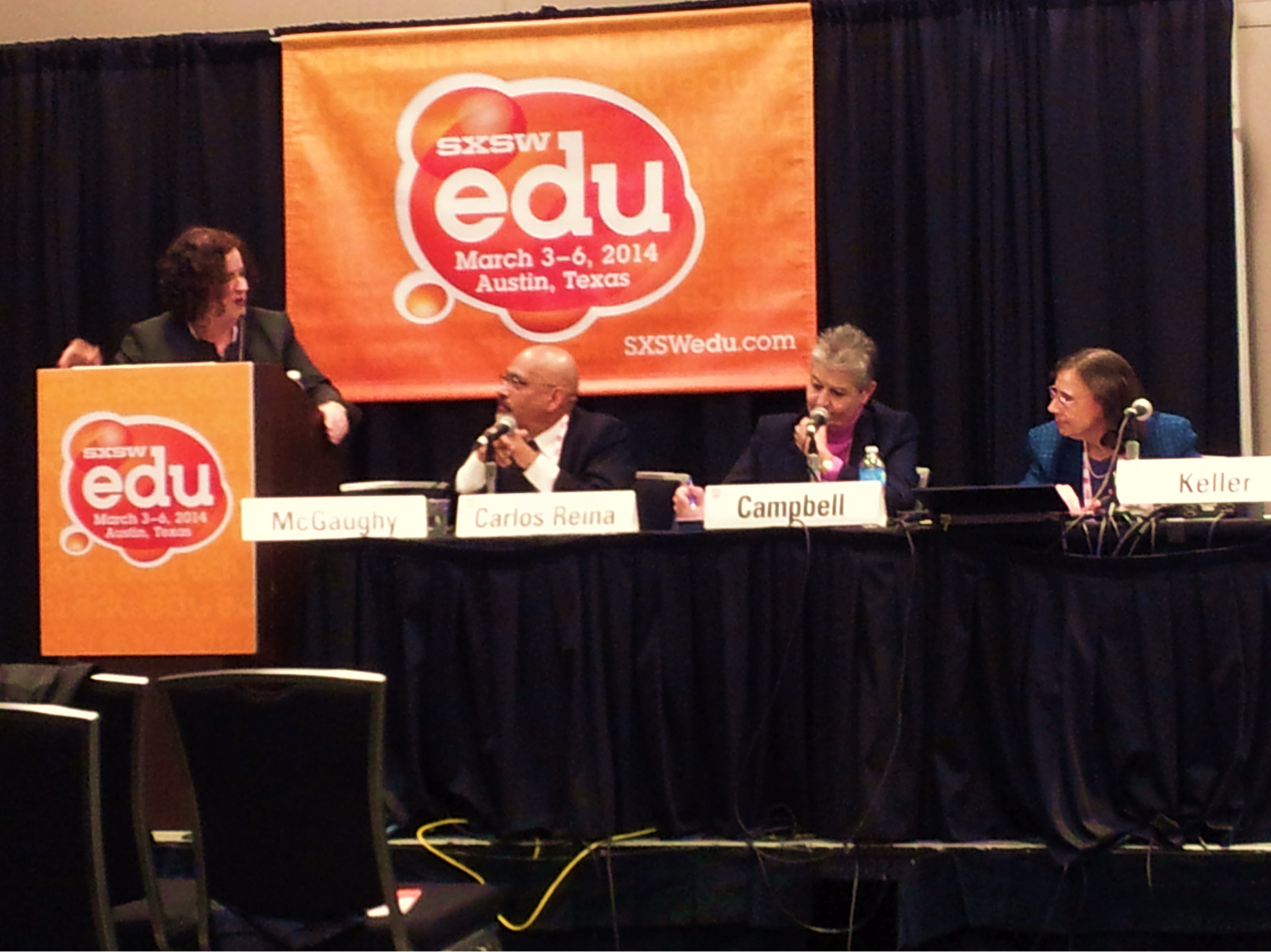Partners in College and Career Readiness Present at SXSWedu in Austin, Texas
March 2014 | Houston, Texas
BY: Amy Williams
South by South West (SXSW), an annually recognized national festival of music, film, and technology that is held in Austin, Texas since 1987, launched SXSWedu in 2010 to give the public a platform to discuss and share ideas on innovative education. This year’s conference was held during March 3 - 6, 2014.
Among the hundreds of workshops held at SXSWedu, panels discussing vertical alignment and college and career readiness were significantly represented, as leaders in the field shared the vast work Texas has done over the past few years.

Vertical Alignment Between K-12 & Post-secondary, facilitated by Dr. Charis McGaughty, Director of Research Projects at Educational Policy Improvement Center (EPIC), was one such panel. It included Dr. Juan Carlos Reina, Director of Houston Pathways Initiative, Dr. Jean Keller, Co-Project Director of Academic Vertical Alignment Training and Renewal (AVATAR), and Pam Campbell, Director of San Jacinto Pathways Initiative. Dr. Ginger L. Gossman, Director of Planning and Accountability at the Texas Higher Education Coordinating Board, organized the session.
“Texas is about two years ahead of the rest of the country in terms of statewide efforts to improve college and career readiness,” said McGaughy. “What excites me is that Texas is leading the nation in this work in a lot of ways and to hear these three strong partnerships, these three examples fromof the panelists, really solidified that thinking for me.”
The panel’s audience consisted of attendees from all over the United States. National programs committed to college and career readiness (CCR), such as Advancement Via Individual Determination (AVID), were present, as well as philanthropists who were interested in the notion of educational pipelines.
Keller presented the work she and Co-Director Mary Harris have led through AVATAR. In 2010, Vertical Alignment Teams (VATs) were developed, which currently create pipelines from secondary to postsecondary education to ensure students learn the necessary skills and concepts needed to be successful in college. AVATAR’s website is also host to hundreds of lesson plans, VAT meeting recaps, and resources for teachers to implement vertically aligned curriculum. AVATAR is supported by a Texas Higher Education Coordinating Board grant and facilitated by the North Texas Regional P-16 Council. Read more about AVATAR.
“AVATAR work may include how a math course from the secondary to the post-secondary levels is aligned, so that students are successful and not required to be involved in developmental education,” said Keller. “AVATAR’s goal is to help students matriculate through secondary to postsecondary systems in a smooth and seamless manner.”
Reina and Campbell presented the work happening through the Houston and San Jacinto Pathways Initiatives; Pathways have also been formed in 6 other regions across the state of Texas. One distinguishing feature of the Pathways Projects is that the teams research correlations between the Texas College and Career Readiness Standards (CCRS) and Texas Essential Knowledge and Skills (TEKS) to the college entrance exam Texas Success Initiative (TSI).
"Data is being used to identify inequalities in student performance between high school and college so that they can target these areas for improvement,” said Reina.
Over the last three consecutive spring semesters, Houston Pathways students have averaged an increase of 1.4 levels on college entrance exams.
One of the most important aspects of the projects is that they are all sustainable. Partnerships between secondary, two-year and four-year institutions have been solidified, and the resources put forth can be used by any school ready to join the pipelines.
“The key piece for our AVATAR project is that it is scalable, and the model is definitely one that resonates with educators and students throughout the state — be that rural, suburban, or urban schools,” said Keller.
The panel closed with addressing some audience questions including funding, data analysis, and sustainability.
“Ultimately, we are going to affect policy. We're interested to see the impact on student success that follows,” said Reina.
McGaughy also announced that she will be releasing a releasing her book she is co-authoring with Dr. Andrea Venezia this fall entitled, Supporting the Dream: How High School and Colleges Can Partner to Improve College and Career Readiness. It will feature a practitioner-based focus on how to engage in CCR work, while using specific examples she has gathered across the nation.
“Getting two systems that have historically worked independently . . . to collaborate and work together is not easy work,” said McGaughy. “These folks have been doing it for several years now, and they gave great examples on how to address these challenges and become successful in this work.”
Read more about the work education leaders are doing in your area to further CCR in the state of Texas by visiting the TXCCRN Newsroom or browsing the Initiatives page.
---
EPIC, founded by Dr. David Conley, is a nonprofit organization located in Eugene, Oregon, whose mission is to improve public education for students who have historically been underrepresented in higher eduation. McGaughy helped with the four-year Texas College and Career Readiness Initiative, which created the Texas College and Career Readiness Standards (CCRS). In addition, she has directed numerous state projects to improve the state of CCR in Texas.


 Show Printable Version
Show Printable Version